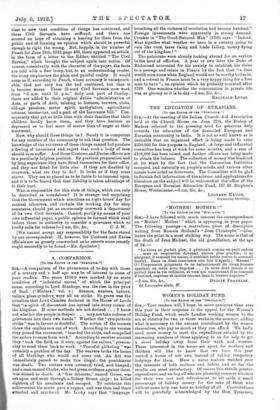A COMPARISON.
[To Tax EDITOR or TER "SPECTATOR:1 SIR,—A comparison of the phenomena of to-day with those of a century and a half ago may be of interest to some of your readers. The years 1768-9 were marked by an acute condition of "industrial unrest," of which the principal cause, according to Lord Stanhope, was the rise in the price of food. ("History," vol. v.) Seamen, weavers, hatters, tailors, glass-grinders, were all on strike. So grave was the situation that Lord Camden declared in the House of Lords that " a spirit of discontent has spread into every corner of the kingdom. If some methods are not devised . . . I know not whether the people in despair . . . may not take redress of grievances into their own hands." Whether the "sympathetic strike" was in favour is doubtful. The action of the seamen threw the coalheavers out of work. According to one version they joined the movement, "boarded the ships, and compelled the sailors to cease from work." According to another account they " took the field, as it were, against the sailors," presum- ably to send them back to work. "Peaceful picketing " was certainly a problem of the day. The weavers broke the looms of all blacklegs who would not come out. An Act was immediately passed to make this illegal : the punishment was death. Two cutters were arrested, tried, and hanged ; and a man named Clarke, who had given evidence against them, was stoned to death. A "free labourer," named Green, was set upon and went through a Sidney Street siege : he killed eighteen of his assailants and escaped. To celebrate this achievement his sister gave a supper, and was then and there attacked and marderal. Mr. Lcky says that "language
breathing all the violence of revolution had become habitual."- Foreign investments were apparently in strong demand. Croaker in " The Good-Natured Man" (1768) says : " Indeed, what signifies what weather we have in a country going to- ruin like ours, taxes rising and trade falling, money flying out of the kingdom ? "
The patricians were already looking abroad for an asylum in the hour of affliction. A year or two later the Duke of Richmond accounted for his anxiety to establish his claim to a peerage and estate in France by the fact that "a time would soon come when England would not be worthy to live in,, and a retreat in France must be a very happy thing for a free man to have"; an opinion which he probably recanted after 1789. One wonders whether the conversation in private life was as gloomy as it is to-day.—I am, Sir, &c., REGINALD LUCAS.


















































 Previous page
Previous page